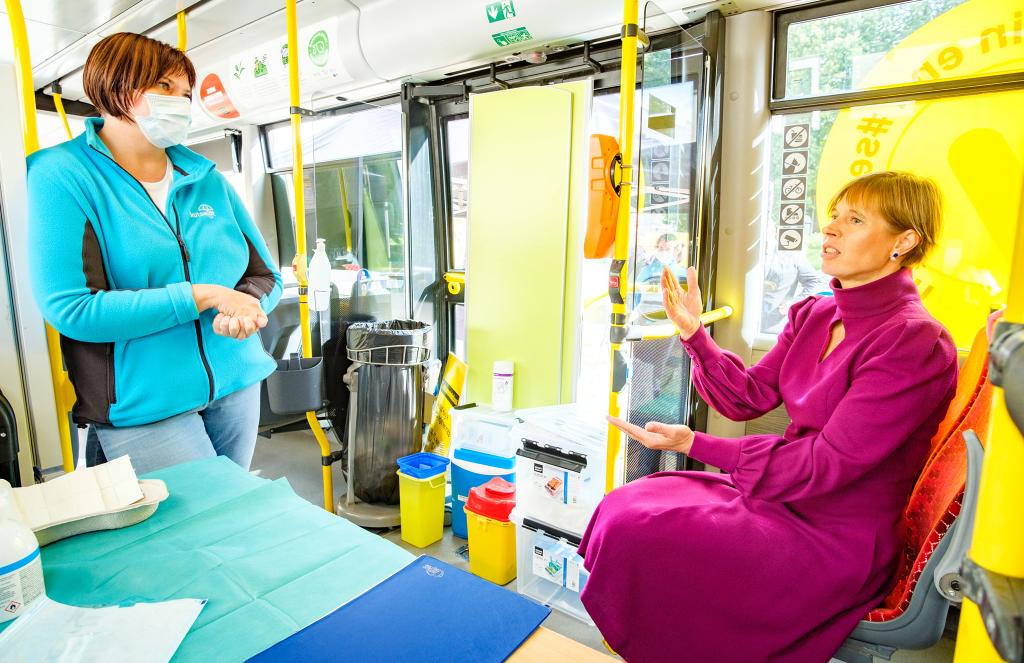Thessaloniki gets ready for its metro launch in November
The underground rapid transit lines have been under construction for almost two decades due to various project delays
 TheMayor.EU logo
TheMayor.EU logo 
Outgoing President Kersti Kaljulaid visiting a vaccination bus in Tartu, Source: Kersti Kaljulaid on Facebook
Organizing the vaccination process effectively and quickly is impossible without involving the local government, they believe
Estonia’s new vaccination plan needs to include a carefully weighed and negotiated role of local governments and expectations for the plan's realization, the Association of Estonian Cities and Rural Municipalities (ELVL) says in an open letter disseminated by ERR. The letter is signed by Tiit Terik, chairman of the board of ELVL and Jan Trei, deputy director of the union.
Citing the successful cooperation of local governments with the Ministry of Social Affairs at the onset of the pandemic, including sharing of crisis strategies, experience and good practice, ELVL draws attention to an U-turn on the part of the state. This was acknowledged at a recent extraordinary session of the parliamentary Budget Control Committee on vaccination activities which concluded that the state has failed to involve local governments or their associations in putting together a vaccination plan.
This is inexplicable, as organizing the vaccination process effectively and quickly is impossible without involving the local government, as it is the public authority standing closest to the people and the most trusted political institution in Estonia, ELVL points out.
The Association recalls that local governments have helped to speed up the vaccine rollout on their own initiative. They have worked with GPs to specify vaccination appointments; offered transport to the elderly and people with reduced mobility; published vaccination calls and explanations in local papers and social media; cooperated with the Health Insurance Fund and authorized private companies to offer residents a convenient time and place to be inoculated. ELVL has also given local authorities updated information through direct mail and social media and, based on its proposal, the social ministry has created a COVID-19 list with immediate vaccination info.
The letter points to the vaccination successes of the city of Tartu and the municipality of Harku. As of 5 August, Harku has vaccinated 47.45 percent of residents in the 12-17 age group and 70.06 percent of those aged 18 and over. The local government has organized a vaccination bus, and raised awareness using all available communication channels, such as social media, schools, village associations and libraries. ELVL lauds Harku’s performance as “a brilliant example of a local government taking the initiative and producing results”.
An example of a vaccination laggard catching up with the leaders is Tallinn's Lasnamäe borough where vaccination buses can now be seen in the parking lots of virtually every supermarket with people queuing to be jabbed.
The Association wants to be included in the creation and execution of vaccination and implementation plans. Also, it proposes disseminating coordinated information openly and explaining the need for vaccination in a language that is understandable by all.
A sufficient supply of vaccines and people to administer them is essential, and everyone should be able to choose a vaccine. There should be fewer restrictions for people who are vaccinated – a simple way to demonstrate the benefit of immunization.
Since many local governments have contributed to the organization of vaccination at their own expense (e.g. transport), the Association proposes compensating them and highlighting the good performers.
In conclusion, ELVL calls on the national government to trust its local counterparts and involve them in decision-making processes, as they share a common goal: bringing the crisis to an end and people back to normal life.

The underground rapid transit lines have been under construction for almost two decades due to various project delays

Now you can get your wine in Talence by paying directly in Bitcoin

That’s because the state has to spend money on updating the railway infrastructure rather than subsidizing the cost of the popular pass

Rethinking renewable energy sources for the urban landscape

The examples, compiled by Beyond Fossil Fuels, can inform and inspire communities and entrepreneurs that still feel trepidation at the prospect of energy transition

Now you can get your wine in Talence by paying directly in Bitcoin

The 10th European Conference on Sustainable Cities and Towns (ESCT) sets the stage for stronger cooperation between the EU, national and local level to fast track Europe's transition to climate neutrality.

At least, that’s the promise made by the mayor of Paris, Anne Hidalgo

The underground rapid transit lines have been under construction for almost two decades due to various project delays

At least, that’s the promise made by the mayor of Paris, Anne Hidalgo

Hostal de Pinós is located in the geographical centre of the autonomous region

Despite its church-y name, the district has long been known as the hangout spot for the artsy crowds

Urban dwellers across the EU are having a say in making their surroundings friendlier to people and the environment.

Forests in the EU can help green the European construction industry and bolster a continent-wide push for architectural improvements.

Apply by 10 November and do your part for the transformation of European public spaces

An interview with the Mayor of a Polish city that seeks to reinvent itself

An interview with the newly elected ICLEI President and Mayor of Malmö

A conversation with the Mayor of Lisbon about the spirit and dimensions of innovation present in the Portuguese capital














